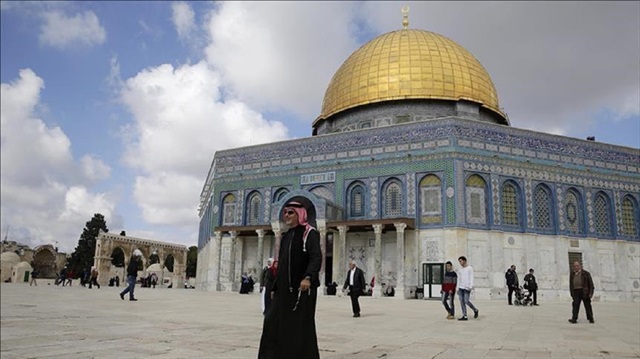
Israel's recent ban on representatives of 21 NGOs from entering its territory reflects the "undemocratic" policy of the Israeli authorities and its attempt "to frighten and silence" those who disagree with its methods and uncover its violations against the Palestinian people’s rights, according to the president of the French-Palestinian Solidarity Association (AFPS).
AFPS -- the largest French organization supporting the Palestinian cause -- and BDS-France along with 11 European and 6 U.S. groups have been banned by Israel due to their support for the Boycott, Divestment and Sanctions (BDS) movement, which is a global campaign launched in 2005 by 172 NGOs to create more economic and political pressure on Israel as well as to end international support for its occupation of Palestinian land.
Bertrand Heilbronn told Anadolu Agency on Thursday that he denounced the Israeli decision which he described as "an attempt to frighten and silence all voices that uncover its daily policies and violations against the Palestinian people’s rights".
Israel's blacklist includes the British War on Want, BDS Italy, the European Coordination of Committees and Associations for Palestine, the Friends of Al-Aqsa, the Ireland Palestine Solidarity Campaign, the American Friends Service Committee, the American Muslims for Palestine, the Jewish Voice for Peace, the Code Pink and the National Students for Justice in Palestine. BDS Chile and South Africa are also on the list, according to Israeli daily Haaretz.
"With this decision, Israel should stop claiming it is democratic. Israeli occupation is committing a flagrant breach of international conventions and treaties with such prohibitions against those who want to see the Palestinians," said the AFPS president.
Heilbronn said his association would mobilize support of parliamentarians and politicians sympathetic to the Palestinian cause in the coming days, in order to pressure the French presidency and government to issue a statement condemning "Israel’s criminal practices and actions against French citizens".
He added that in case the Israeli government did not back down on the ban, the French government should be firm and impose a reciprocal sanction.
"There are some red lines. When the red lines are crossed, sanctions must be applied on the Israeli government," he said.
Heilbronn went on to say that in recent weeks the pressure by Israeli soldiers on the Palestinians had grown "very violent", however the international community's response to this violation of international law was still "inadequate".
Pointing to an Israeli draft law approved last week that would allow Palestinian “terrorists” to be sentenced to death, the French activist said "as the pressure on Palestinians continue, governments must mobilize and impose serious sanctions on Israel" and its "immunity should be abolished".
Palestinian officials have denounced the bill and described it as "fascist”, saying it aims to provide legal cover for Israel's brutal repression of Palestinian rights.
In November last year, the Israeli government banned a number of European parliamentarians and French mayors from entering Israel under the pretext of their activity within the BDS movement.
The delegation, part of the "Barghouti network" -- named after prominent Palestinian Fatah leader Marwan Barghouti, who is serving five life sentences in Israel -- was planning to visit Barghouti and Salah Hamouri, a French-Palestinian prisoners’ rights activist arrested by Israeli forces last August.
France in 2016 became the first EU member state to enforce a 2015 EU decision stating that products from Israeli settlements should be clearly labeled, a move which sparked a diplomatic crisis with Israel at the time.
Paris published in Nov. 2016 a guideline on enforcing the EU regulations, urging businesses to use labels to identify goods produced in Israeli settlements from the West Bank, including annexed east Jerusalem, which the international community considers occupied Palestinian land, and the Golan Heights, which Israel seized from Syria in 1967.
The international law views the West Bank and East Jerusalem as occupied territories and considers all Jewish settlement-building activity there as illegal.















